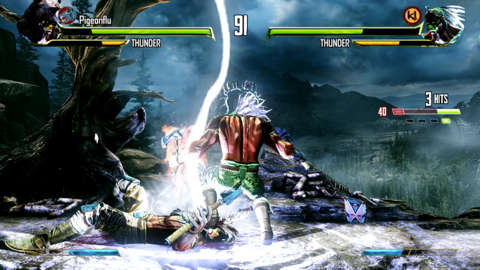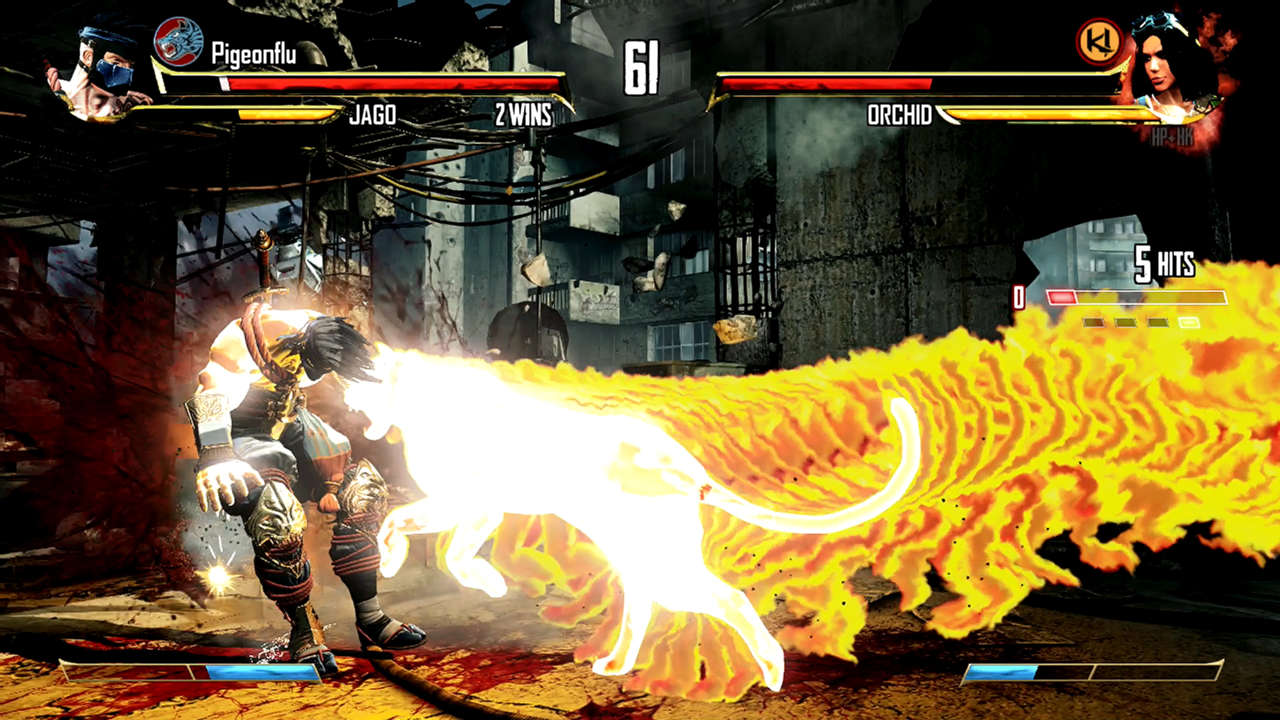Review in Progress: Killer Instinct
Combos were made to be broken.
Killer Instinct is back, and this past week I spent a lot of quality time with the game. However, at the time of this writing, Killer Instinct's online multiplayer is not yet up and running. This means I'm not ready to pass judgment on the game just yet, but I wanted to share with you my thoughts and impressions on what I've played so far.
Combat in a fighting game is a war on two fronts, and Killer Instinct's combat is no exception. There's the battle against other players, and the battle against yourself. Against other players, you dance around the battlefield, ducking in and out of striking range while searching for a crack in their armor. Blow-by-blow, Killer Instinct's muscle-bound roster conveys a satisfying sense of weight and force, while still feeling responsive to your commands. Whether through technique or sheer luck, when you finally find that crack and land a hit, that's when the battle against yourself begins.
STAR WARS: Prequel Pack - Official Reveal Trailer DEAD OR ALIVE Xtreme Venus Vacation PRISM - Official 2nd Trailer Phantom Blade Zero - 6 Minute "Year of the Snake" Gameplay Trailer The Hundred Line -Last Defense Academy-: Character Trailer 1 Black Ops 6 & Warzone - Official Season 02 Launch Trailer GUILTY GEAR STRIVE: DUAL RULERS - Official Main Trailer Marvel Rivals | The Spring Festival Trailer Kingdom Come: Deliverance 2 Roadmap Trailer Zenless Zone Zero - Astra Yao Character Demo | "Ridu Holidays" BlazBlue Entropy Effect - Hazama Character DLC Gameplay Reveal Trailer Helskate Launch Trailer Code Violet | Announcement Trailer
Please enter your date of birth to view this video
By clicking 'enter', you agree to GameSpot's
Terms of Use and Privacy Policy
Each successful hit raises the question, "Do I know, in this moment, the correct timing and sequence of button presses to combo into to deal the maximum amount of damage to my opponent?" This is especially true in a game such as Killer Instinct, where long, strategic combos are how you deal the most damage. Capitalizing on these moments is key to winning the fight, and if the opportunity passes by, you have no one to blame but yourself. This is why any seasoned fighting game player will tell you there's a big difference between losing a match and being beaten. One is your fault; the other is your opponent's.
What makes Killer Instinct interesting compared to most modern fighters is how it simplifies its combo system while adding on a layer of player-versus-player mind games. The game has some very long combos, but they're easier to execute than, say, a wall-carry tag combo in Tekken Tag Tournament 2 or Magneto's hyper grav loop in Ultimate Marvel vs. Capcom 3. This is by design, since both players have something else to worry about during a combo besides timing button presses to 1/60th of a second: each other.

Explaining Killer Instinct's combo system is more complicated than using it. In brief, a character's special moves can be easily linked together using normal punches and kicks to form long combo strings. It's a system that empowers new players by letting them rack up a double-digit combo, such as by inputting Jago's laser sword over and over.
However, if you want to get the most out of your combos, you have to know the system's nuances--such as which moves are combo enders. Ending a combo with a combo ender nets you more damage, more energy, or a chance to extend your combo further. So, while the all-Jago-laser-sword combo may look impressive, since it doesn't end with a combo ender, you don't get much in return.
In most fighting games, long combos are a one-way street. Getting caught in one means you just have to sit there and take it--or knock the controller out of your opponent's hands. Some games, such as the Guilty Gear series, let you interrupt combos, but doing so is a limited-use technique. Not so in Killer Instinct. The game's iconic c-c-c-combo breakers are a constant threat, and their inclusion helps keep both players feeling engaged with each other more often during a fight.
There are three different types of combo breakers the defender may attempt during a combo. These are light, medium, and heavy--the same as the game's three different attack strengths. If the defender successfully enters the combo breaker that's the same strength as the attack he or she is currently enjoying, then the combo is instantly broken. Breakers don't deal any damage, but they do put some space between the two players--essentially setting them back to square one. They also don't cost anything to use, so you're encouraged to attempt them. However, you cannot spam breakers freely, since inputting the wrong one triggers a lockout for a few seconds, during which your opponent may gleefully pummel you without concern.

The combo breaker, while powerful, is not a "get out of jail free" card that works 30 percent of the time. If you're laying down a combo and suspect a breaker is in your immediate future, you can attempt a counter breaker. As its name suggests, this technique overrides the combo breaker and lets you stay on the offensive. Unlike the combo breaker, however, the counter breaker is risky. It costs half of your total energy, and if used at the wrong time, it leaves you completely vulnerable to attack.
So far I've had a lot of fun exploring the nuances of Killer Instinct's combat system. Its simplified combos free me up to worry more about playing mind games with my opponent and less about running a manual dexterity challenge. Of course, I've still got a lot to learn as I prepare to take the fight online. Be on the lookout for the full review of Killer Instinct on the Xbox One later this week.
Got a news tip or want to contact us directly? Email news@gamespot.com
Join the conversation